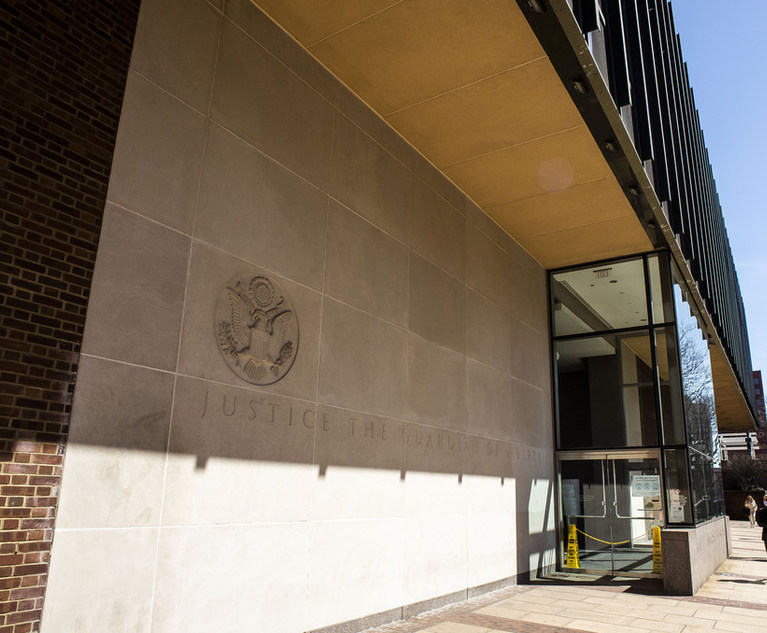 James A. Byrne U.S. Courthouse, which houses the U.S. Court of Appeals for the Third Circuit, and the U.S. District Court for the Eastern District of Pennsylvania, in downtown Philadelphia, PA, on April 3, 2021. Photo: Diego M. Radzinschi/ALM
James A. Byrne U.S. Courthouse, which houses the U.S. Court of Appeals for the Third Circuit, and the U.S. District Court for the Eastern District of Pennsylvania, in downtown Philadelphia, PA, on April 3, 2021. Photo: Diego M. Radzinschi/ALM Legit or Abusive? Businesses Argue for Bankruptcy Protection as Talc Lawsuits Mount
The U.S. Chamber of Commerce, the American Tort Reform Association, the National Association of Manufacturers, the Product Liability Advisory Council and the Washington Legal Foundation filed amicus briefs on Monday before the U.S. Court of Appeals for the Third Circuit backing the Chapter 11 case of Johnson & Johnson subsidiary LTL Management.
August 23, 2022 at 03:26 PM
4 minute read
Five business groups filed amicus briefs Monday defending Johnson & Johnson subsidiary's talcum powder bankruptcy as a legitimate legal maneuver to resolve crippling mass tort litigation.
In amicus briefs before the U.S. Court of Appeals for the Third Circuit, the U.S. Chamber of Commerce, the American Tort Reform Association, the National Association of Manufacturers, the Product Liability Advisory Council and the Washington Legal Foundation argued that the Chapter 11 case of Johnson & Johnson subsidiary LTL Management was a better alternative to the courts, where talcum powder cases have languished in multidistrict litigation and only a few dozen of the 38,000 lawsuits have gone to trial.
"In short, MDL is not a one-size-fits-all model meant to displace other options—such as bankruptcy—that are capable of bringing efficient and widespread resolution to an ever-growing mountain of lawsuits," wrote Jaime Santos, a Washington, D.C., partner at Goodwin Procter, in an amicus brief for the National Association of Manufacturers and Product Liability Advisory Council.
Monday's amicus briefs lined up in support of LTL Management's Aug. 15 brief, which seeks to uphold a Feb. 25 ruling rejecting dismissal of its Chapter 11 case. A claimants committee representing plaintiffs suing Johnson & Johnson over ovarian cancer and mesothelioma petitioned the Third Circuit to reverse the ruling, insisting that the Chapter 11 filing of LTL Management, created through a controversial Texas divisional merger statute, lacked "any valid bankruptcy purpose."
The briefs mirror the compare-and-contrast conclusions in New Jersey Chief Bankruptcy Judge Michael Kaplan's dismissal decision, which found that bankruptcy would provide more fair and equitable compensation to all current and future talc plaintiffs when compared with the much slower-paced tort system. Since 2014, only 49 talc trials have gone to verdict, although jurors in many of them awarded tens of millions of dollars, and one was $4.7 billion to 22 women, later lowered on appeal to $2.1 billion.
 Chief Bankruptcy Judge Michael Kaplan. Courtesy photo
Chief Bankruptcy Judge Michael Kaplan. Courtesy photo In Monday's briefs, the business groups said multidistrict litigation has limits: It can't address future claimants, or plaintiffs in state courts, yet often attracts meritless claims, all of which make it a poor vehicle for obtaining a global settlement. Bankruptcy, in contrast, has benefits not just for corporations but also shareholders, employees and plaintiffs, particularly those who have yet to file lawsuits, the briefs say.
"The bankruptcy system benefits current and future claimants by cutting the inefficiencies of the mass-tort system," said Cory Andrews, general counsel of the conservative Washington Legal Foundation, in a statement.
Amicus groups filed briefs supporting the claimants last month. The American Association for Justice said Kaplan undervalued multidistrict litigation, which has successfully obtained mass tort settlements, and sanctioning the Chapter 11 case would open the doors to other abuses of the bankruptcy system, according to its brief.
"The court below viewed this case as a competition between the tort system and a bankruptcy trust," AAJ's brief says. "But constitutional concerns must not be brushed aside in the name of speed and efficiency."
That's because key among the claimants' arguments is that LTL Management filed its Chapter 11 case in bad faith. And a bankruptcy filed in bad faith creates constitutional concerns by depriving plaintiffs of their Seventh Amendment right to a jury trial, according to the amicus briefs supporting the claimants.
But Andrews, in the WLF's brief on Monday, said the true reason claimants are fighting LTL Management's bankruptcy is because plaintiffs lawyers make more fees in the mass tort litigation system. Bankruptcy, in contrast, has more control over the professionals involved.
"The attempt to block what is a legitimate use of the Chapter 11 system is motivated by plaintiffs' lawyers' desire to bring their cases in a flawed mass tort system where high-dollar awards, low evidentiary standards, and low barriers of entry are the norm," said ATRA President Tiger Joyce. "The funds approved in bankruptcy to pay legal claims create a level playing field for all claimants, whereas litigation often results in a 'race to the courthouse,' in which some may receive windfalls while others may fare poorly."
Bankruptcy law professors were split on the LTL Management case, filing competing amicus briefs before the Third Circuit.
The talc bankruptcy has attracted attention outside the mass tort world. Earlier this year, the Senate Judiciary Committee's Subcommittee on the Federal Courts, Oversight, Agency Action, and Federal Rights held hearings on alleged abuses of the bankruptcy system in light of the LTL Management case.
NOT FOR REPRINT
© 2025 ALM Global, LLC, All Rights Reserved. Request academic re-use from www.copyright.com. All other uses, submit a request to [email protected]. For more information visit Asset & Logo Licensing.
You Might Like
View All
Topping Kirkland, Weil Won the Most Valuable Major Bankruptcy Retentions of 2024

How New Jersey’s Pragmatic Bankruptcy Approach Sets It Apart Post-'Purdue Pharma'
7 minute read
Law Firms Mentioned
Trending Stories
- 15th Circuit Considers Challenge to Louisiana's Ten Commandments Law
- 2Crocs Accused of Padding Revenue With Channel-Stuffing HEYDUDE Shoes
- 3E-discovery Practitioners Are Racing to Adapt to Social Media’s Evolving Landscape
- 4The Law Firm Disrupted: For Office Policies, Big Law Has Its Ear to the Market, Not to Trump
- 5FTC Finalizes Child Online Privacy Rule Updates, But Ferguson Eyes Further Changes
Who Got The Work
J. Brugh Lower of Gibbons has entered an appearance for industrial equipment supplier Devco Corporation in a pending trademark infringement lawsuit. The suit, accusing the defendant of selling knock-off Graco products, was filed Dec. 18 in New Jersey District Court by Rivkin Radler on behalf of Graco Inc. and Graco Minnesota. The case, assigned to U.S. District Judge Zahid N. Quraishi, is 3:24-cv-11294, Graco Inc. et al v. Devco Corporation.
Who Got The Work
Rebecca Maller-Stein and Kent A. Yalowitz of Arnold & Porter Kaye Scholer have entered their appearances for Hanaco Venture Capital and its executives, Lior Prosor and David Frankel, in a pending securities lawsuit. The action, filed on Dec. 24 in New York Southern District Court by Zell, Aron & Co. on behalf of Goldeneye Advisors, accuses the defendants of negligently and fraudulently managing the plaintiff's $1 million investment. The case, assigned to U.S. District Judge Vernon S. Broderick, is 1:24-cv-09918, Goldeneye Advisors, LLC v. Hanaco Venture Capital, Ltd. et al.
Who Got The Work
Attorneys from A&O Shearman has stepped in as defense counsel for Toronto-Dominion Bank and other defendants in a pending securities class action. The suit, filed Dec. 11 in New York Southern District Court by Bleichmar Fonti & Auld, accuses the defendants of concealing the bank's 'pervasive' deficiencies in regards to its compliance with the Bank Secrecy Act and the quality of its anti-money laundering controls. The case, assigned to U.S. District Judge Arun Subramanian, is 1:24-cv-09445, Gonzalez v. The Toronto-Dominion Bank et al.
Who Got The Work
Crown Castle International, a Pennsylvania company providing shared communications infrastructure, has turned to Luke D. Wolf of Gordon Rees Scully Mansukhani to fend off a pending breach-of-contract lawsuit. The court action, filed Nov. 25 in Michigan Eastern District Court by Hooper Hathaway PC on behalf of The Town Residences LLC, accuses Crown Castle of failing to transfer approximately $30,000 in utility payments from T-Mobile in breach of a roof-top lease and assignment agreement. The case, assigned to U.S. District Judge Susan K. Declercq, is 2:24-cv-13131, The Town Residences LLC v. T-Mobile US, Inc. et al.
Who Got The Work
Wilfred P. Coronato and Daniel M. Schwartz of McCarter & English have stepped in as defense counsel to Electrolux Home Products Inc. in a pending product liability lawsuit. The court action, filed Nov. 26 in New York Eastern District Court by Poulos Lopiccolo PC and Nagel Rice LLP on behalf of David Stern, alleges that the defendant's refrigerators’ drawers and shelving repeatedly break and fall apart within months after purchase. The case, assigned to U.S. District Judge Joan M. Azrack, is 2:24-cv-08204, Stern v. Electrolux Home Products, Inc.
Featured Firms
Law Offices of Gary Martin Hays & Associates, P.C.
(470) 294-1674
Law Offices of Mark E. Salomone
(857) 444-6468
Smith & Hassler
(713) 739-1250







